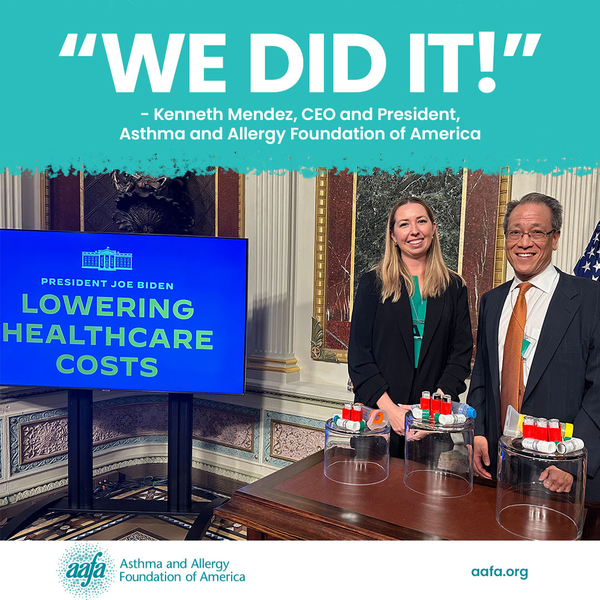Updated as of April 3, 2024:
We did it! We took awareness of asthma inhaler pricing all the way to the White House!
The Asthma and Allergy Foundation of America (AAFA) joined President Biden and Senator Bernie Sanders today for a briefing on health care costs and inhaler pricing.

The White House invited AAFA President and CEO Kenneth Mendez and AAFA Senior Director of Policy and Advocacy Jenna Riemenschneider in recognition of our advocacy work to advance health equity for people with asthma.
AAFA is pushing to lower the costs of asthma and allergy medicines, including inhalers. We know the high cost of medicine can be a barrier to treatment.
Some major asthma inhaler manufacturers have announced $35 a month caps on out-of-pocket costs. The price cap will apply to people with commercial/private insurance or no insurance. The inhalers that will be price capped include:
AstraZeneca (effective June 1, 2024):
- AIRSUPRA® (albuterol and budesonide) inhalation aerosol
- BEVESPI AEROSPHERE® (glycopyrrolate and formoterol fumarate) inhalation aerosol
- BREZTRI AEROSPHERE® (budesonide, glycopyrrolate, and formoterol fumarate) inhalation aerosol
- SYMBICORT® (budesonide and formoterol fumarate dihydrate) inhalation aerosol
Boehringer Ingelheim (effective June 1, 2024):
- Atrovent® HFA (ipratropium bromide HFA) inhalation aerosol
- Combivent® Respimat® (ipratropium bromide and albuterol) inhalation spray
- Spiriva® HandiHaler® (tiotropium bromide) inhalation powder
- Spiriva® Respimat®25 mcg (tiotropium bromide) inhalation spray
- Spiriva® Respimat®5 mcg (tiotropium bromide) inhalation spray
- Stiolto® Respimat® (tiotropium bromide and olodaterol) inhalation spray
- Striverdi® Respimat® (olodaterol) inhalation spray
GSK (with price change going into effect no later than Jan. 1, 2025):
- Advair Diskus (fluticasone propionate and salmeterol inhalation powder)
- Advair HFA (fluticasone propionate and salmeterol inhalation aerosol)
- Anoro Ellipta (umeclidinium and vilanterol inhalation powder)
- Arnuity Ellipta (fluticasone furoate inhalation powder)
- Breo Ellipta (fluticasone furoate and vilanterol inhalation powder)
- Incruse Ellipta (umeclidinium inhalation powder)
- Serevent Diskus (salmeterol xinafoate inhalation powder)
- Trelegy Ellipta (fluticasone furoate, umeclidinium, and vilanterol inhalation powder)
- Ventolin HFA (albuterol sulfate inhalation aerosol)
AAFA is leading the way to reduce health care costs for people with asthma
"On behalf of the 27 million people in the United States with asthma, we appreciate the leadership of President Biden and Senator Sanders to bring down costs for asthma treatments. Pricing announcements made in March by some manufacturers of inhalers will mean lower costs and improved access to asthma medicine for many people with asthma starting this June,” said AAFA President and CEO Kenneth Mendez. “As President Biden indicated, more can and should be done. It’s not just drug companies, others need to step forward. We welcome continued efforts to improve affordability and accessibility of these essential medicines so all patients can get the treatment they need.”
AAFA continues to raise the voice of the patient community and draw attention to the ways America’s complex drug pricing ecosystem makes asthma medications more expensive for people who need them most. Drug manufacturers, pharmacy benefit managers, insurers, employers, and the government must work together to improve affordability and access.
Access to affordable drugs is a critical component of reducing racial disparities in asthma. Black and Hispanic individuals not only experience higher rates of asthma but also are more likely to be uninsured or underinsured. Deaths due to asthma – although decreasing overall – occur at a much higher rate in the Black and Puerto Rican populations than in the White population. Black individuals are nearly three times as likely to die from asthma than White individuals.
Last fall, AAFA shared patient stories and its Asthma Disparities in America report with the Senate Health, Education, Labor, and Pensions (HELP) Committee which then launched an investigation into the high price of asthma inhalers early this year.
AAFA’s research indicates that when the cost of medicine becomes a barrier to treatment, people with asthma resort to rationing or simply discontinue use.
Access to asthma medications can save lives, reduce hospitalizations, and lower the more than $82 billion in annual costs to the U.S. economy from this chronic disease. But the U.S. health care system is complex, and often leaves patients with few affordable options.
Stay in the loop - get news and advocacy updates straight to your inbox with our e-newsletters.


Comments (8)